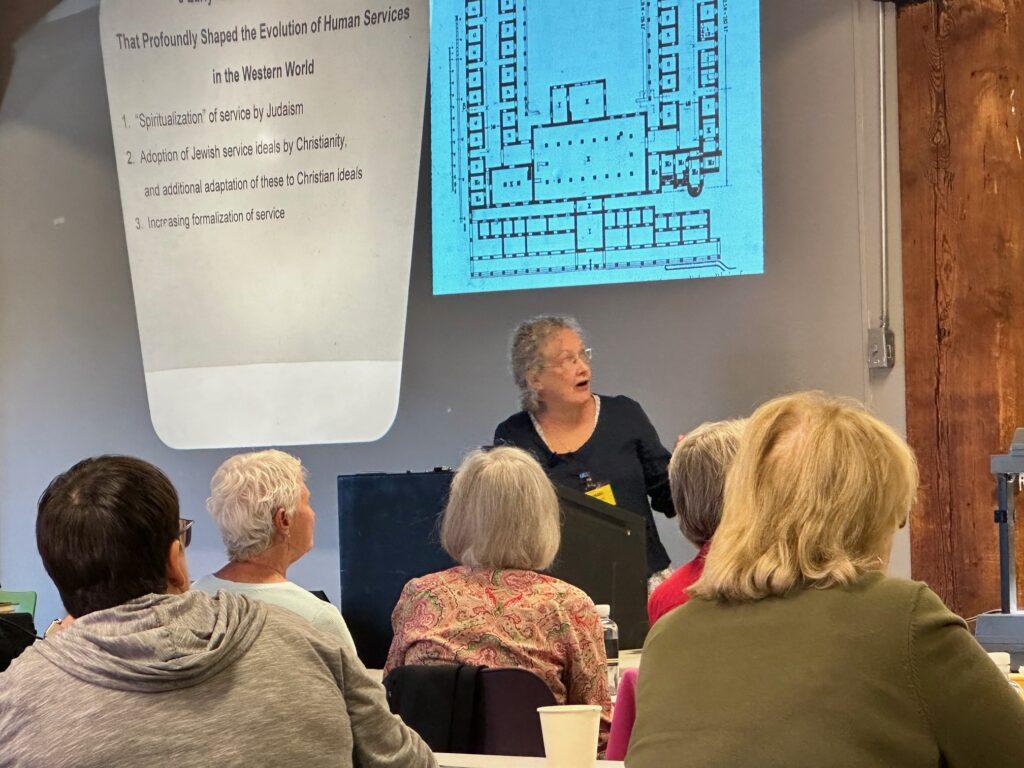
A recap of the final workshop in our Gather for Change series
On September 10 and 11, 2024, the Consortium hosted a workshop at the Heinz History Center on the History of Human Services. Led by Susan Thomas of the Training Institute for Human Service Planning, Leadership, and Change Agentry at Syracuse University, and co-presented by Tom Malcolmson, PhD, and Jack Yates, the workshop was funded by a “Gather for Change” grant from the Pennsylvania Developmental Disabilities Council. Attendees included people with disabilities as well as allies in the fields of disability services, healthcare, and disability history.
Using more than 600 images of human services settings and works of art, the workshop provided an overview of major human services concepts and practices in the Western world from ancient through modern times – from the informal, voluntary forms to the highly formalized and commercialized systems of today.
Day One of the workshop focused on how the provision of services for people with disabilities over more than 2,000 years has been “inextricably interwoven” with care for the poor, ill, and unwanted. Throughout historic eras, assumptions about vulnerable populations as well as political, economic, and cultural realities have shaped the evolution of human services. For example, in the 15th through 17th centuries, human services took a disturbingly dark turn toward segregation and brutalization of the people served.
Day Two of the workshop continued the discussion of political, economic, and cultural changes in the 18th century that led to the alienation of human services from its more humanistic roots, negative perceptions of marginalized people as burdens and menaces, condoning harsh treatment, and promoting eugenics. Historic review shows that these emerging viewpoints influenced service patterns into the mid-20th century.
Presenter Susan Thomas worked for 40 years at the Training Institute for Human Service Planning, Leadership, and Change Agentry at Syracuse University under the direction of renowned professor Wolf Wolfensberger (1934-2011), whose theory of Social Role Valorization has been a strong influence on disability policy and practice. Thomas is the co-author (with Wolfensberger) of the PASSING instrument for evaluating service quality, and the author or co-author of numerous articles on Social Role Valorization.
Co-presenter Thomas Malcomson, PhD, was for 32 years a professor in the School of Liberal Arts and Sciences, at George Brown College in Toronto, Ontario, Canada, where he taught courses in Introductory, Social, and Developmental Psychology. He co-authored of a Life-Span Development text, and has taught courses on the history of eugenics and genocide. Prior to teaching, he worked in human services, including serving intellectually and physically disabled people.
Co-presenter Jack Yates has been a teacher of human service staff and families for over forty years, largely in the developmental disabilities field. His teaching derives from the ideas of Dr. Wolf Wolfensberger and focuses on such topics as combating the devaluation of impaired people and other marginalized social classes, lessons from human service history, and making connections for excluded people with the community.
The History of Human Services workshop, funded by a “Gather for Change” grant from the Pennsylvania Developmental Disabilities Council, was the last of six free educational events designed to advance awareness of critical topics for people with disabilities, their families, disability activists, and anyone interested in disability rights and history. Learn more about the series (and visit the individual event pages to download any resources available) here.


